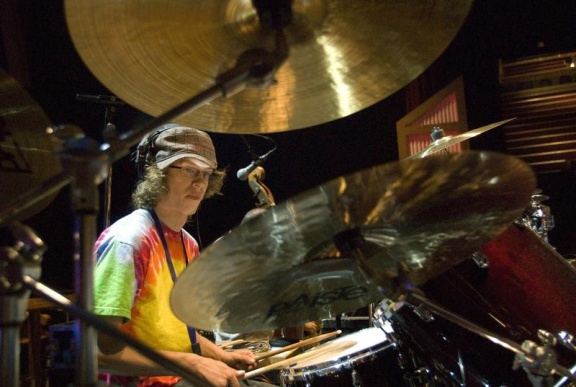Vanderbilt Scientists Search For Elusive Benefits Of Music On The Brain
By EMILY SINER • JAN 26, 2015
SHARETwitter Facebook Google+ Email
[Brendan LeMieux, 22, plays the drums during Vanderbilt's summer camp for adults with Williams syndrome in 2009.]
Brendan LeMieux, 22, plays the drums during Vanderbilt's summer camp for adults with Williams syndrome in 2009.
BRENT WHITMORE / / VANDERBILT KENNEDY CENTER
Listen
Listening...
4:30
Listen to the story, or read below.
Inside a lab at the Vanderbilt Kennedy Center, Reyna Gordon is holding up a tangle of elastic wires connected to electrodes.
“For the kids, we call it a spaghetti hat,” she says with a laugh.
Gordon, a music cognition researcher, fits the spaghetti hat over my head like a shower cap. The electrodes touch dozens of points on my skull. This is how she looks at my brain waves, she explains.
Then, she plays short clips of classical music that are supposed to evoke emotions, just a half second each. My brain response shows up on a computer screen.
A couple of years ago, she and a colleague examined the brain waves of adults with Williams syndrome, a genetic birth disorder that’s often accompanied by heart defects, learning disabilities and a curious affinity for music. The study would play them a short, emotive chord and then show them a picture of a happy or sad face immediately afterward.
"We don't think you can get these benefits from doing just any other activity. But the time is now to do the research to try to understand why."
“It turned out,” Gordon says, “they got a particular brain response when the emotions of the face matched the emotions of the music they had just heard.”
In other words, the study showed a hypersensitivity to emotion in music among people with Williams syndrome. It wasn’t surprising, given the characteristics of people with the disorder, but it also hadn’t been studied scientifically in this way before. Gordon and her colleague were able to conclude that music could help people with Williams syndrome recognize or communicate their emotions.
“Anecdotally, a lot of parents report that it’s extremely important,” Gordon says. “We think it's unique. We don’t think you can get these benefits from doing just any other activity. But the time is now to do the research to try to understand why.”
After The Mozart Effect
This is hardly the first theory about music's interaction with the brain. One of the most pervasive, which gained popularity in the '90s, is the “Mozart effect,” which claims that listening to Mozart makes you smarter. There’s a whole industry around selling classical music to newborns — Amazon.com has titles like “Baby Genius Mozart” and “Build Your Baby’s Brain.”
The problem with the Mozart effect? It’s not true. It was debunked years ago. " Even in the studies with positive results the enhancement is small and lasts about 12 minutes," one researcher wrote in 2001.
“It’s frustrating to me that people write off music cognition research just because the Mozart effect didn’t pan out,” Gordon says.
The field is a sort of offspring of neuroscience and music theory, and it believes there are scientifically sound relationships between music and things like language, social skills or even intelligence. It’s a relatively new field, Gordon says, and it’s still struggling to establish a reputation.
"There's going to be a recognition that this work can no longer be ignored — that it has powerful health benefits."
That’s made it difficult to find funding, says Mark Wallace, director of the Vanderbilt Brain Institute.
“National Institutes of Health, which is a major funding agency for a lot of the research here at Vanderbilt, I think still looks upon music cognition as a soft area of science,” Wallace says.
But he believes that perception is starting to change.
“There is a lot of emerging evidence that it could be a really powerful tool in therapy in individuals who have neurological illness or children who have developmental disabilities,” Wallace says. “This is where NIH is going to get in the game. There’s going to be a recognition that this work can no longer be ignored — that it has powerful health benefits.”
Applying Music To Language
Gordon’s most recent work examined one potential benefit: how music can help kids learn language.
In a recent study, she and a researcher from Michigan State set up a game to test children on their ability to differentiate rhythms. Then, they tested the kids on their syntax, or the way they structure sentences.
They discovered that children who did well with musical rhythm also did well with that component of grammar. Gordon doesn’t know a definite reason yet — that’s what she wants to figure out next.
Once she knows why, Gordon says, she might be able to help kids with language disorders. She could predict if children will have trouble speaking based on their musical ability, for example, or show that music classes would help kids develop their speaking skills.
It sounds optimistic, but Gordon is a believer in the power of music: She was a trained classical singer before getting into neuroscience.
“Musicians know there are a lot of benefits to music,” she says. Whether those can be scientifically proven — that’s what she is trying to figure out.
TAGS:
